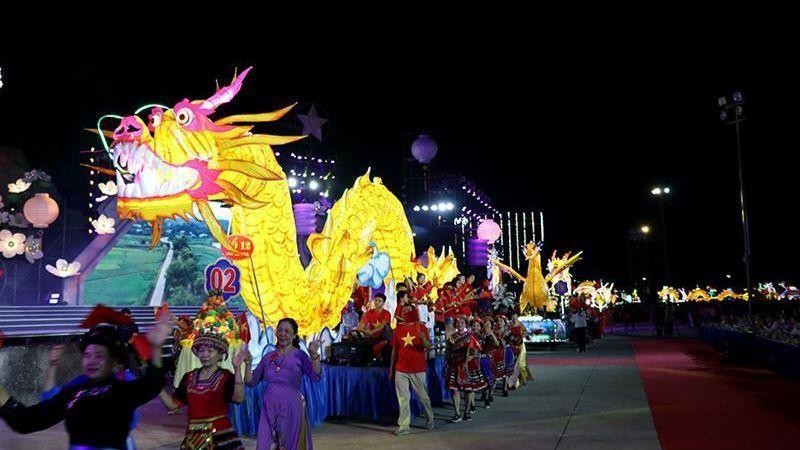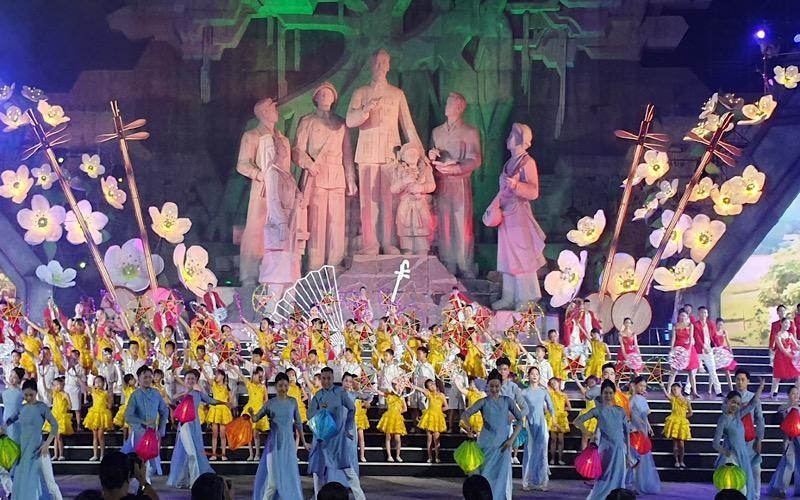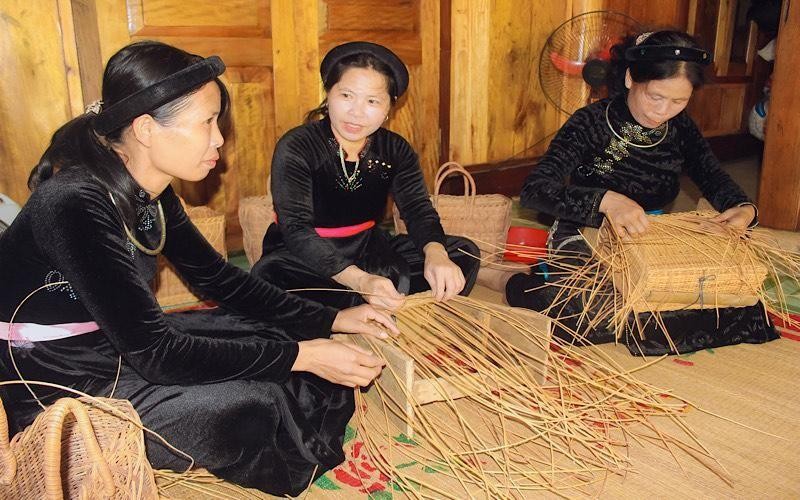Tuyen Quang is home to numerous historical and cultural traditions, a “revolutionary museum” of the country. Ethnic minorities here have created unique cultural nuances, with a rich treasure of special festivals. That historical and cultural tradition is now becoming a driving force for development.

Thanh Tuyen Festival attracted a large number of visitors. (Photo: NDO)
During the August Revolution of 1945, Tuyen Quang was proudly chosen by the Party Central Committee and Uncle Ho as the capital of the Liberation Zone to lead the nation's revolution.
In Tan Trao Commune, many important historical events took place, determining the fate of the country, towards the victory of the August Revolution in 1945, giving birth to the Democratic Republic of Vietnam and opening a new era of national independence associated with socialism.
During the resistance war against the French colonialists, once again, Tuyen Quang was honoured to become the capital of the Resistance, supported by Uncle Ho, the Party Central Committee, the National Assembly, the Government, and the Fatherland Front. And almost all ministries, departments and branches, the central agencies chose Tuyen Quang as their headquarters to lead the resistance.
This place was chosen as the venue for many important events: the 2nd National Congress of the Party - the first Congress was held domestically and the only Congress held outside Hanoi.
With a history spanning nearly 200 years of establishment and development, with 22 ethnic groups living together, while sticking to and conquering nature, the Tuyen Quang ethnic groups have created a long tradition with unique cultural features which have taken root in the residential community, creating its own nuances and rich cultural heritages for the land of Tuyen Quang.
To date, the province has 546 historical, cultural and scenic sites, including 435 historical relics of the revolution and resistance war. Along with the beautiful natural scenery, traditional cultural values imbued with ethnic identities have created the soul of this place.
Kinh, Tay, and Cao Lan groups have wet rice culture. Mong, Dao, and Pa Then ethnic groups live in high mountainous areas, contributing to creating a magnificent system of terraced fields.
The Dao people have a rich treasure of folk knowledge, especially folk remedies...
Each ethnic group also expresses its identity, soul and personality through traditional costumes and culinary culture, especially in the way eating and drinking is imbued with cultural identity.
The spiritual life of people in Tuyen Quang is very diverse. Festivals imbued with national identity are often held in the early spring, such as the Long Tong Festival (Going to the Field), the festival to pray for the harvest, the festival of Dong Tien, the festival of pounding rice...
These traditional agricultural festivals are meant to pray for favourable weather, for all things to flourish, for a bountiful harvest and for the people to be peaceful and prosperous.
The Gieng Tanh and Minh Cam Communal House festivals of the Cao Lan ethnic group are held to commemorate and give thanks to those who have built a place to live and patronise the villagers to live happily.

The ceremony to honour Then singing as an intangible cultural heritage of humanity. (Photo: NDO)
Some festivals have been cared for and restored, such as: the Mother procession at Ha Temple, Thuong Temple and Y La Temple (Tuyen Quang City); and the Mother procession at Thac Cam Communal House (Ham Yen), etc.
In recent years, Thanh Tuyen Festival has become a unique form of Mid-Autumn Festival with spectacular street festivities, creating a special imprint and cultural identity of local people.
With their talents and exquisite aesthetic abilities, along with soaring and generous souls, the artisans have created vivid models imbued with folk identity for children on the occasion of the annual Mid-Autumn Festival.
The festival was recognised by the Vietnam Guinness Book of Records as having the largest and most unique lanterns in Vietnam.
The locality’s treasure trove of folklore knowledge has been accumulated over many generations. From the oral transmission of poems, ancient stories and proverbs to folk songs and dances, they reflect the concepts of the ethnic minority groups regarding the universe and the attitude towards nature, people and things. They are indispensable spiritual dishes in the daily activities of ethnic minority people. They appear on happy days, holidays, and in the community's cultural activities.
Among them, Then singing and the melody of ‘dan tinh’(gourd lute) is a unique traditional artistic heritage of the Tay ethnic minority people. In 2020, the practice of Then by Tay, Nung and Thai ethnic minority groups was honoured by UNESCO as an intangible cultural heritage of humanity.
The fire dance festival of the Pa Then ethnic minority people is one of the very special and humane religious activities, expressing the courage and extraordinary strength of man while fighting against the uncertain natural events. The dance conveys the aspirations of farmers for health, favourable weather, good crops, peace and happiness.
There are now more than 200 folk singing and dance clubs, including 70 for Then singing and gourd lute playing and six for 'Pao Dung' folk singing of Dao ethnic people. They have contributed to promoting cultural and artistic movements among the community as well as to preserving the cultural identities of the ethnic minority groups.

The craft of traditional rattan and bamboo weaving has been restored to serve tourism in Na Hang district.
Many districts such as Lam Binh, Na Hang and Son Duong have been successfully strengthening the preservation of cultural heritages while associating them with the development of community-based tourism. They turned the cultural characteristics of the ethnic minority groups, including costumes, housing, cuisine and folk songs, into unique tourism products that have proven attractive to both domestic and international visitors. For example, Lam Binh District has developed 26 homestays, attracting more than 15,000 guests each year.
Member of the Party Central Committee and Secretary of Tuyen Quang Provincial Party Committee Chau Van Lam said the historical and cultural values, which have been preserved, passed on and nurtured, have helped form a good cultural tradition of local people. They are the noble spiritual values towards the cohesion of the community.
The Party committees and people of all ethnic groups in Tuyen Quang Province will continue uphold the heroic historical tradition and the strength of the great national unity to effectively exploit all resources for the rapid and sustainable socio-economic development, thus becoming a comprehensively developed province in the northern mountainous region.
Hai Chung - Translated by NDO